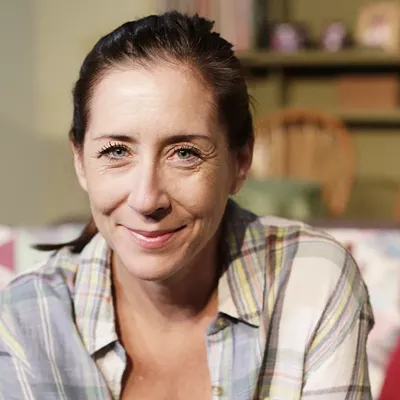
Oksana Boiko had always talked about moving — away from her hometown, away from her country, Ukraine. But for 42 years, she never did.
"It was never possible to leave," she says. "My roots were so deep."
But then war hit. In one swift motion, she says in Russian through a local translator, she had to "cut her roots" and leave.
And now she's sitting in a conference room in Spokane, in a country she never wanted to come to, living in a former motel room.
A huge Ukrainian flag in iconic blue and yellow hangs behind the reception desk of the onetime Quality Inn just northeast of downtown.
The nine-story apartment building where Boiko's family lived back in Irpin still stands, though shockwaves from explosion after explosion from Russian shelling have busted out the windows.
Boiko talks rapidly, bubbling with opinions, nuance, memories — cracking jokes. She smiles and laughs. Her husband, Yaroslav Hrabovskyi, is more laconic and reserved.
On the one hand, they're deeply grateful for everything others have done to get them here. How Ukrainian Spokanites who Boiko previously taught via remote Zoom exercise classes during COVID had invited them to come to Spokane. How a local church raised money for their airfare. How their necessities, and beyond, have been provided for them. How they were invited to this hotel, which the new local nonprofit Thrive International offered rent-free through July, and at a very low rate after that.
"At every point and level I sense and I feel this caring," says Hrabovskyi. "This is something that surprises me about America."
On the other hand, the couple isn't remotely used to this outpouring of kindness. They've been in America barely a month, and already they're antsy. Usually, they're the ones helping others.
Hrabovskyi worked at a Christian nonprofit called Mission Eurasia. He and his wife spent their former lives in Ukraine trying to help homeless people, drug addicts and alcoholics. They'd even adopted a disabled child born to a homeless woman seeking rehabilitation.
"There was a time when we were helping, and now people are helping us," says Hrabovskyi, "and this is a completely different feeling."

thrive International Director Mark Finney had been thinking about the housing problem for years back when he was director of World Relief, an Evangelical refugee resettlement organization in Spokane.
The growing housing crisis was clear as early as 2016. During that last year of his second term, President Barack Obama dramatically upped the cap on refugees. And with Spokane's vacancy rate at rock-bottom levels, finding places for those refugees to live became all the more difficult.
"Literally, every time we got housing for somebody, it was like a 'Praise the Lord' miracle scenario," Finney says.
He'd pitched the idea of World Relief getting involved more directly in housing — buying up properties — but the national organization wasn't interested in going in that direction. So last year, as a flood of Afghan refugees entered the United States, he assembled some allies, pooled their resources and bought land with 16 apartment units, intending to use it to house refugees fleeing Afghanistan. He'd be able to build on an existing vacant land, too.
But then, World Relief became immersed in a major controversy, one that caused Finney to question his role at the nonprofit. The national organization had a policy banning anyone in a same-sex marriage from working there, and a gay Spokane attorney sued after World Relief withdrew a job offer.
To Finney, a local pastor, the ban was particularly perverse considering the kinds of discrimination that some of the refugees often were fleeing.
"I've literally met people at the airport whose first question to me was, 'I'm gay in my country. They were trying to kill me. Is it OK for people to know that I'm gay in America?'" Finney says. "Like, before we get their bags off their baggage carousel."
In January, Finney resigned in protest.
A month later, Putin invaded Ukraine. Ukrainian immigrants coming to Spokane in the aftermath also weren't actually eligible for federally subsidized refugee relocation funds and case-management work that World Relief provided.
For six months, meanwhile, the owners of the former Quality Inn building had already been looking to lease the space to a nonprofit.
All those circumstances converged to put Finney in the perfect place to make a big move. He launched Thrive International, and, thanks to an infusion of Washington State Department of Commerce funds and some additional grant money, he was able to open up five floors of former hotel space for Ukrainians fleeing the war.
"We already knew that there were at least 100 refugee families in Spokane from Ukraine who were doubled up and needed some space," Finney says.
With subsidies, these refugees could be charged a reduced rent rate of $300 to $600, depending on the size of the room. This cost reduction gives them a runway of three to six months to get up to speed on living in America. They can start learning English, figure out our transportation system, get their kids enrolled in school and hopefully find a job to become more financially independent. It's not just focused on helping refugees survive, in other words. It's helping them thrive.
Boiko and Hrabovskyi are eager to launch their new lives. They have a child with special needs, so they don't just need a school — they need a specialist to help them. They've already filled out their work authorization paperwork, but there's a lot more they need to do.
Go to thriveint.org/donate to make a financial donation. At the same page, you'll also find an opportunity to buy needed goods from Amazon, including school supplies, bathroom kits, baby items, toys and more.
Hrabovskyi is trained as an accountant. Boiko has experience leading fitness classes, but her friends have pointed out her other talents as well. Maybe she should be a caregiver, they've told her. She's already caring for two disabled children.
All of this is so new — even the homeless people they see, the sort they used to help in Ukraine, they can't communicate with. They don't speak the language.
"We're completely dependent on others, we don't even know what the next step should be," Boiko says.
But soon, that's going to change.
"We're the training wheels," Finney says. "Once they really know how to ride the bike, the training wheels come off and there's no going back." ♦


























